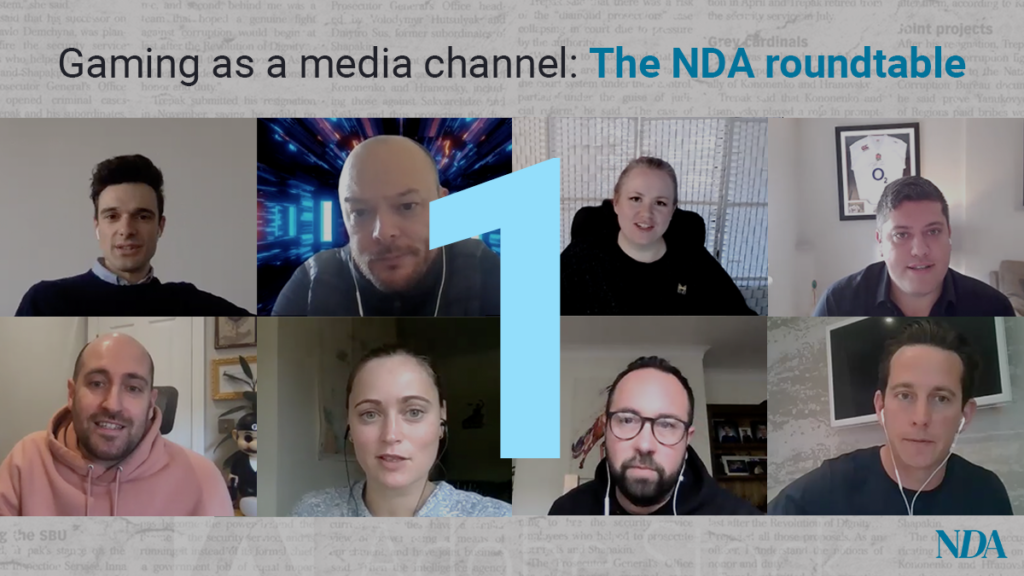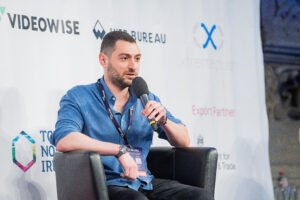Gaming will be the “channel of channels and swallow other channels within”, according to OMG’s Phil Rowley.
“If you don’t understand now how to use it as a brand, it’s like ignoring the invention of television – it’s that important,” continues Rowley, who runs Omnicom Media Group’s Futures arm.
He was one of the speakers at New Digital Age’s latest roundtable, which aimed to explore how advertisers can benefit from the rise of gaming and gamers. It’s worth more than cinema and music combined now as an entertainment industry but media spend has lagged behind.
Jeremy Taylor, VP EMEA at Anzu.io; Greg Carroll, Activision’s global VP of revenue; Haley Uyrus, head of brand communications at Mediatonic; Jerry Daykin, EMEA Senior Media Director, GSK; Samuel Huber, founder and CEO at Admix; Dominic Woolfe, Azerion UK CEO; and Marie Binet, Account and Innovation Director at Publicis Sport and Entertainment joined NDA Editor Justin Pearse to discuss gaming as a media channel.
Their views on the potential of gaming to advertisers will be explored in a series of features generated from this discussion, including why gaming has lagged behind as a media channel to date, how publishers are integrating new ad formats into their games, what the COVID pandemic has meant for consumer behaviour and who today’s gamer is. Hint: it’s probably half (or more) of your social circle.
Taylor says everything is changing – and quickly. “Gaming could become a metaverse in itself,” he suggests, pointing to initiatives such as the Travis Scott concert on Fortnite. “And I think that shift has come from connectivity.
“Ten years ago gaming was about playing on your own on a single device, whereas now because of connectivity it’s become a fully-fledged social media platform.”
Carroll agrees, suggesting that “gaming” might now be a misnomer. “It’s too broad a term and it’s filled with too many misperceptions,” he says, adding that today’s mobile phone is far more powerful than the consoles of the past.
Woolfe admits such misconceptions exist and are something that they as a business are focussing on.
Gaming is such a broad church. We seem to talk about more established media in a different way. There are lots of different genres in cinema, just as there are lots of different types of games and gamers. However gaming seems to be such a catchall which I believe isn’t helpful. We need to break up gaming into its different component parts.
Gaming has certainly gone mainstream, particularly because of free-to-play – it’s not just the hardcore audience of the past. It’s why the numbers are now so big and cannot be ignored. I’m pleased to say most agency groups are now really focussed on what gaming can deliver for their clients.”
Huber was never the typical teenager gamer, who as a child did not own a console. “But today I am a gamer because I play hyper-casual games. Gaming has gone mainstream, particularly because of free-to-play – it’s not just the hardcore audience of the past. It’s why the numbers are now so big, and a lot of advertisers don’t realise how easy it is to be involved.”
“Binet says a lot of her team’s job is helping brands understand the opportunities by splitting it into Casual Gaming (amateur gamers playing games both offline and online) and esports (professional teams and players competing for prize money and millions of fans tuning in to watch the action).
“Gaming is incredibly broad and contains a multitude of access points and opportunities which can make it intimidating for brands entering the space for the first time. Clear terminology will be very important in helping to bring clarity and meaning to brands and clients going forward.”
Daykin, who was – and remains – a gamer is excited by the opportunities but as an advertiser needs to balance the brand opportunity with the opportunities available. He says advertisers can be wary despite its recent hype, because of myths and misunderstandings as well as understanding the metrics and ROI. “The simplest answer to this is that advertisers are quite busy, they do a lot of other things already.”
Binet believes that defining the metrics has to be key over the next year, particularly for advertisers used to old school media. For instance, she says that at the moment most of the eSports metrics are based on digital metrics – “and a Twitch view is hard to compare with an average programme view when on TV,” she adds. Common metrics are also needed across the landscape. “We are going to have to put everything on the table and compare,” she adds.
Uyrus concludes: “The more people we can get into games, the better. And if we need a different term that would make people feel more comfortable, then that’s even better.”









